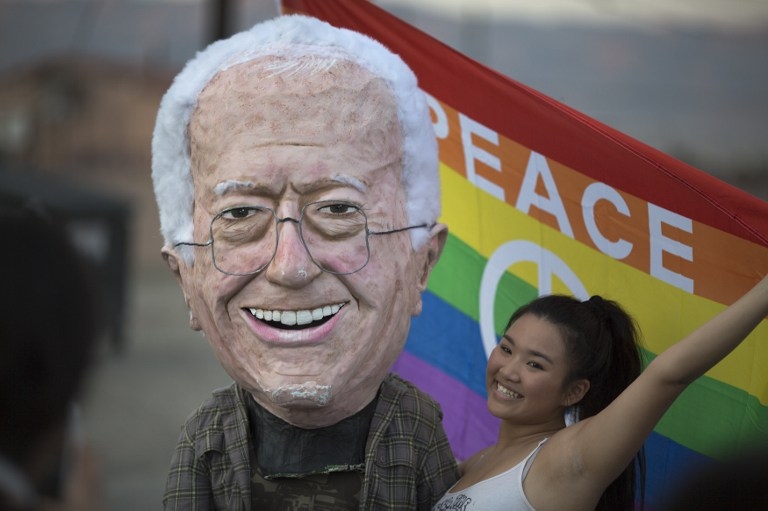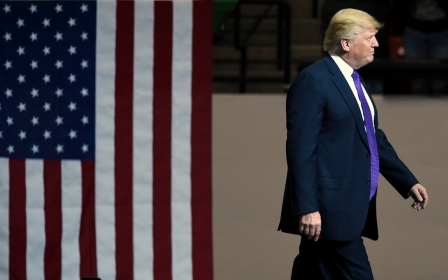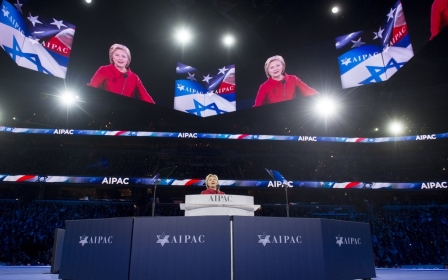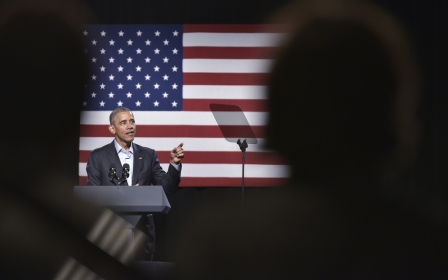Sanders' slippery semantics: No, it is not a 'disproportionate response'

Slowly but surely, global north-based activists for Palestinian human rights have made significant progress in redressing our image as “blood-thirsty terrorists” bent on “killing the Jews” because of some ahistorical, unprovoked hatred.
And while the Boycott, Divestment and Sanctions (BDS) movement has certainly played a significant role in shifting the discourse on the question of Palestine, we must not forget nor minimise the fact that our victories today are the culmination of decades of persistent activism, long before the call for BDS was issued in 2005. Before BDS forced even the worst Israel apologists to address terms such as “Israeli apartheid,” activists were already challenging and chipping away at the Zionist narrative with its image of Israel as a redemptive democracy, an oasis of civilisation in a barbaric environment.
Yes, BDS propelled the question of Palestine centre-stage in the global north as it offered justice-minded individuals an effective strategy they could engage in, to enact their solidarity. This change is particularly palpable, and empowering, to anyone who has been long working for Palestinian rights. Speaking for myself, I recall when I lectured on Palestine 20-plus years ago, how challenging it was for me to answer the audience members’ predictable question, “What can we do?” with a practical, feasible suggestion.
Someone in the audience would then inevitably propose “education” as the solution, but I, and many of my allies, could not be so naive as to believe that all people needed was to know what was going on, and then they would make it stop. History is replete of horrors that people knowingly engaged in, having somehow rationalised their actions, their crimes, with self-serving justifications.
The power of BDS is that it not only educated, but also completely transformed the narrative, not shying away from accusing Israel of war crimes and crimes against humanity. By insisting on putting on annual events such as Israeli Apartheid Week, and proposing a completely non-violent strategy, BDS empowered as well as educated people.
We must therefore be extremely cautious not to fall back upon old cliches that harmed our cause for decades. Over the past few weeks, thanks to some encouraging statements by US presidential candidate Bernie Sanders, fans have been celebrating what they view as a national accomplishment, namely a US presidential candidate who “dared” to be critical of Israel’s murderous assault on Gaza in 2014. In what has been termed a ground-shifting televised debate watched and later discussed by millions, Sanders emphatically insisted that Israel’s assault was “disproportionate,” even as his Democratic Party rival Hillary Clinton maintained her unflinching support of Israel.
It is indeed a very sad reflection of the mainstream American political scene that a candidate who would criticise some action by Israel - even criticise it harshly - would be viewed as heroic. After all, the entire world, including the US, knows Israel is illegally occupying Palestinian territories, has illegally annexed Jerusalem, is building an illegal separation wall, is demolishing Palestinian homes. It shouldn’t be unthinkable to criticise some of its actions.
But more seriously, it is important to analyse the slippery semantics and unspoken assumptions behind the kudos Sanders is getting from longtime Palestinian rights activists for denouncing Israel's "disproportionate response". We cannot afford to backtrack in our euphoria over the recognition of Palestinian suffering.
You see, when Israel attacks, it is never a "response," it is an offensive assault. When it comes to Israel and Palestine, the “chicken and egg” conundrum is part of the narrative we have debunked many long years ago. Israel is the initiator of violence. Israel is the occupier, the Palestinian people’s land is occupied. Israel violates the human rights of the Palestinians, not the other way round. Israel has displaced the Palestinians, not the other way round.
Our Nakba may be commemorated on 15 May, but it is not over, it is ongoing, with the ongoing home demolitions, land appropriation, extra-judicial executions, the siege on Gaza and the endless restrictions on the population of the West Bank, all perpetrated by Israel against the Palestinian people. We need to be cautious in our own language, so as not to validate and reinforce the dominant discourse.
Too many have shied away from the issue, and too many have shut down any discussion of it, claiming that “it’s complicated”. This is not acceptable. We cannot reverse the clock on all the accomplishments we have made by debunking this excuse. There is nothing “complicated” about Israel’s racism, its privileging of one religion over another, its dispossession of the indigenous people of the land. By being a settler-colonial state founded upon violent displacement and grounded in racist discrimination in order to privilege one group over another, Israel is the initiator of the violence.
The Palestinians are responding to their dispossession. As such, if one is to discuss whether a response is proportionate or not, one needs to look at Palestinian actions only, not Israeli ones. Then we can debate whether Palestinian actions are proportionate to the injustices, the war crimes, the violations of human rights and international law that Israel has been engaging in since its establishment in 1948.
We are indeed shifting the discourse. It is our activism, our centring of the question of Palestine, which made it inevitable for politicians to address Israel’s assaults on the Palestinian people, whether it is to support or criticise these attacks. But as we discuss Sanders’ courage in denouncing “disproportionate response,” we need to be cautious not to suggest that it is indeed a response.
Israel has referred to its cyclical attacks on Gaza as “mowing the lawn,” a chillingly cavalier assertion of its intent to engage in these assaults on a regular basis. The “lawn” is Gaza’s human population, starved, besieged, consistently overwhelmingly of displaced young refugees. Discussing whether these assaults are “proportionate” or “disproportionate” is an implicit acceptance of the validity of Israel’s policy, tantamount to a debate over whether the grass should be six or four inches long.
No, there is no acceptable “proportion” to Israel’s assaults. And it is our responsibility to keep pushing, and to reject the suggestion that somehow, if Israel doesn’t cut the grass too short, doesn’t kill too many children, the Palestinians are getting what they deserve: a “proportionate response”.
As we celebrate a growing and long-overdue awareness of the plight of the Palestinians, we need to be cautious not to suggest that any Israeli assault is justified.
- Nada Elia serves on the steering collective of the US Campaign for the Academic and Cultural Boycott of Israel.
The views expressed in this article belong to the author and do not necessarily reflect the editorial policy of Middle East Eye.
Photo: A Bernie Sanders supporter strikes a pose near a man in a Sanders costume in Coachella, California on 21 April 2016 (AFP)
New MEE newsletter: Jerusalem Dispatch
Sign up to get the latest insights and analysis on Israel-Palestine, alongside Turkey Unpacked and other MEE newsletters
Middle East Eye delivers independent and unrivalled coverage and analysis of the Middle East, North Africa and beyond. To learn more about republishing this content and the associated fees, please fill out this form. More about MEE can be found here.





